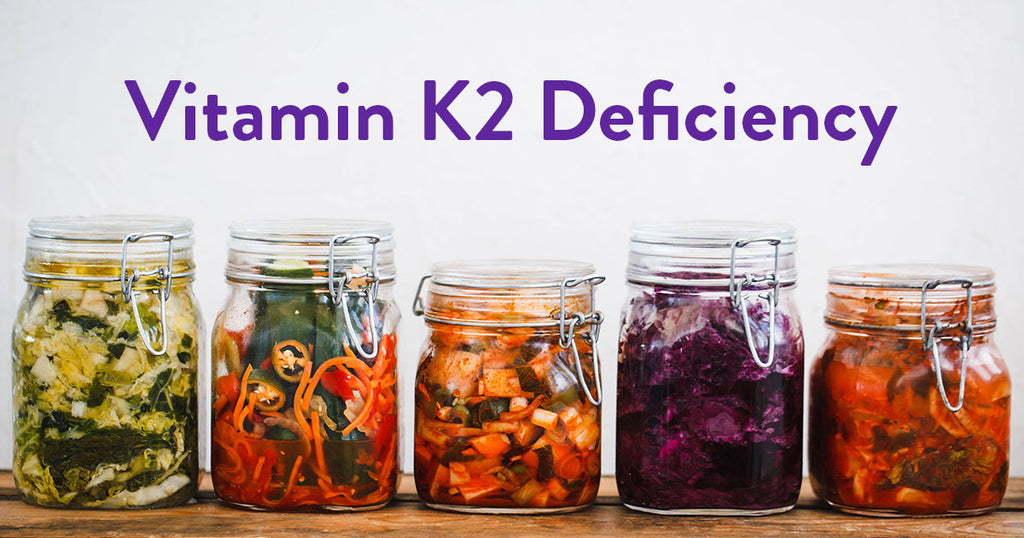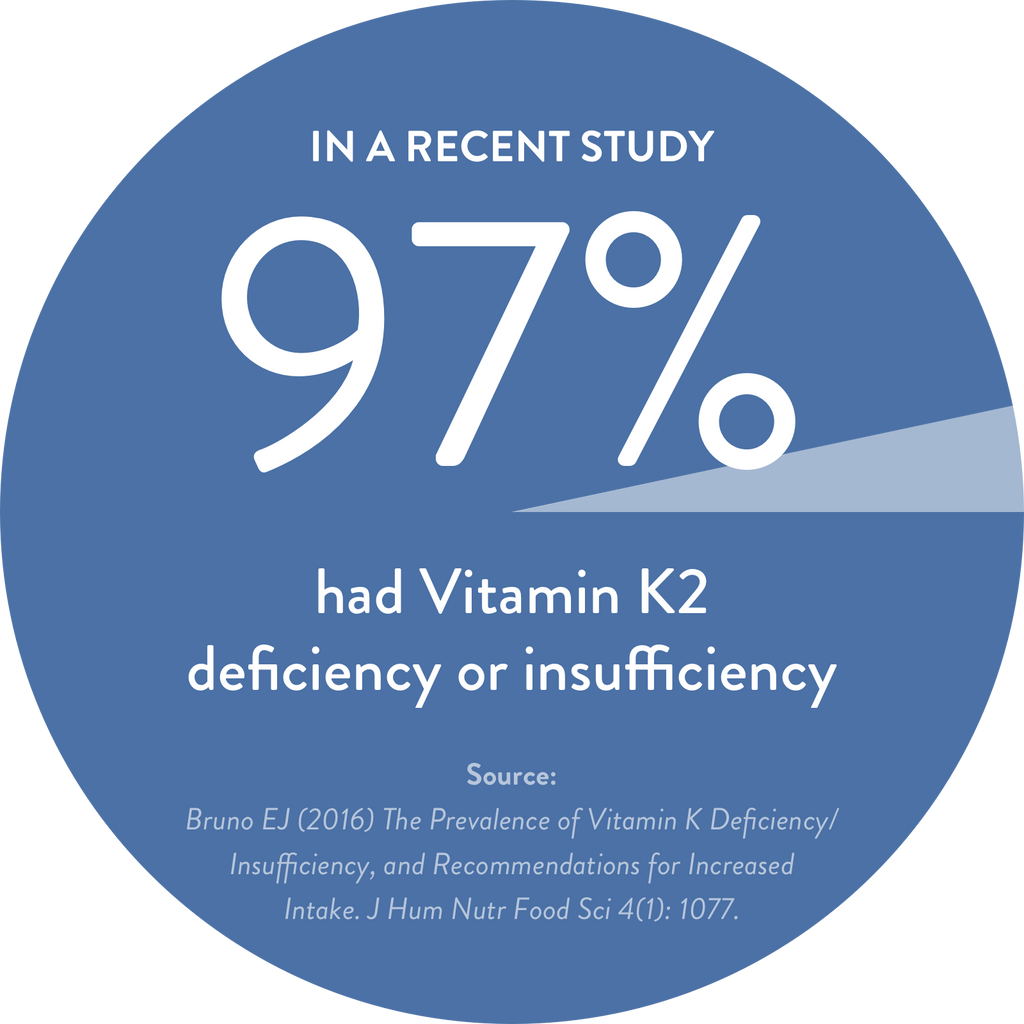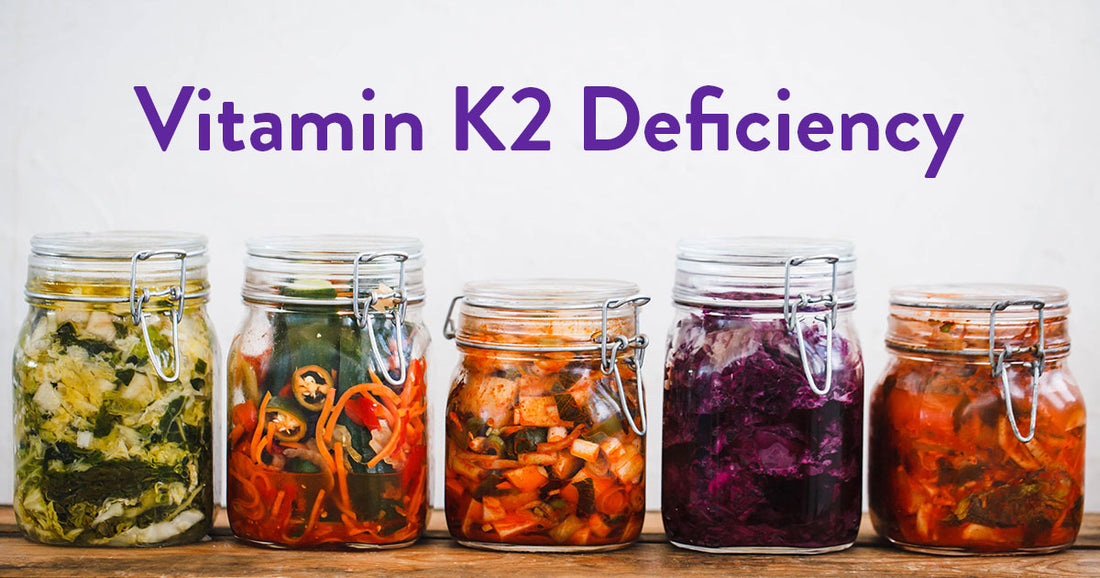
Reading time: 5 minutes
Vitamin K, along with Vitamins A, D, and E are called 'fat soluble vitamins.'
If you take a B-complex (water soluble vitamins), some of the excess is excreted via fluorescent yellow urine. Fun if you're a kid. (OK, fine, fun for grownups too.)
But, if you eat a large quantity of fat-soluble vitamins, they are stored rather than excreted.
Vitamins A, D, and E can be stored for varying periods of time - months, may be even years. After all, the Vitamin D your skin makes in the summer is supposed to last you through winter.
Vitamin K1 is partially recycled, so a little bit goes a long way. Unless you're a newborn or absolutely despise veggies, K1 deficiency is not in the cards.
Why are we so deficient in Vitamin K2?
Unlike Vitamins A, D, and E, Vitamin K2 is not stored in the body for as long as the other fat-solubles. So, K2 deficiency is more likely if you're not regularly eating K2-rich foods.
Nutritionists used to think Vitamin K2 deficiency was rare or if present, not a big deal. It was believed that our diet provided most of it and a little extra produced by our gut microbiome. This view is changing.
Americans no longer eat K2-rich foods like liver, sauerkraut, or organ meats. Traditionally, that's where we got our K2 - animal organs and fermented foods.
We don't like animal organs. We prefer muscle meat. Culturally, we think of organ meats as icky and gross.
And fermented foods also carry a mild ick-factor for most Americans. Besides the unfamiliar odors, fermentation requires allowing bacteria to come in contact with food, something we otherwise think of as both unsafe and undesirable.
The cultural change in diet compounded by less efficient storage of K2 spells trouble for our bones, heart, and other parts. Data backs up that we eat less Vitamin K than we did 50 years ago.
This is dangerous because most health care professionals are still not trained or aware of K2 deficiency symptoms.
'Yeah but,' you say, 'doesn't our gut bacteria convert our abundant K1 into K2?' Maybe. There may be some of that going on too, but when people were given K2 restricted diet, deficiency developed quickly and gut bacteria did not come to the rescue. This means are we still diet-dependent on K2.
K2 deficiency is linked to both calcium build-up in the arteries as well as osteoporosis.
K2 deficiency is also tough to measure.
If you want to know your Vitamin D status, it is fairly easy to do. What's floating about in your blood is a great indicator of what's stored in your body. Not so with Vitamin K2.
K2 doesn't hang around in the blood. It is shunted off quickly to the liver and other organs.
There is no easy and reliable Vitamin K2 test. But there is something else that's very useful.
MGP - a reliable marker of your Vitamin K2 status
MGP stands for Matrix Gla Protein. It's a protein made inside your blood vessels and is involved in calcium metabolism and protects your arteries from calcium buildup.
Vitamin K2 activates Matrix Gla Protein. And absence of Vitamin K2 inactivates it.
MGP is one of 20 or so proteins that are completely dependent on Vitamin K2 for activation. Without enough Vitamin K2, these proteins remain in their inactive state, unable to do their job.
We also know that the higher the inactive MGP, the higher your risk of poor heart health.
And guess what? We can measure the amount of this inactive protein in the blood. While this is not a direct measure of Vitamin K2, it is a reliable marker of your Vitamin K2 status.
We know this because 4 weeks after taking Vitamin K2 supplements, the level of inactive MGP drops. The higher your K2 dosage, the more it drops.
Talk to your doctor about this Vitamin K2 test
Genova Diagnostics offers this test. If you're interested, talk to your doctor about ordering this test. (For the two uber-geeks who've read this far, the actual test is an ELISA for Inactive desphospho-uncarboxylated MGP or dp-ucMGP.)
How common is Vitamin K2 deficiency?
A recent study looked at 452 healthy adults. Their levels of inactive MGP was measure and, lo and behold, 438 out of 452 had high levels of inactive MGP. In other words, 97% of them had Vitamin K2 deficiency or insufficiency.
Yes, 97%.

More evidence of K2 deficiency
There is also evidence that K2 deficiency increases in prevalence with age, with worsening K2 status starting around age 40.
We also know that people on dialysis are very likely to be Vitamin K2 deficient. This isn't just because they eat less K2, but because there may be interference in K2 absorption.
A recent study found that south asian men were much more likely to have high coronary artery calcium (CAC), a newly recognized risk factor for heart health. High CAC is a possible result of chronic low Vitamin K2 status.
In a Polish study, children with bone fractures had much lower Vitamin K2 status than the kids without fractures.
Vitamin K2 deficiency in elderly hip fracture patients is also very high. The unfortunate patients in this study left the hospital post-surgery with K2 deficiency that was twice as bad as when they were admitted. Clearly, the hospital food was lacking in K2. This also speaks to how quickly Vitamin K2 deficiency can manifest.
Non-dietary factors that may worsen K2 deficiency:
-
Long-term antibiotic use
-
Dilantin use during pregnancy
-
Low fat diet
-
Fat blocking supplements or pills like Alli
-
Cholesterol-lowering drugs like bile acid sequestrants
-
Mineral oil
-
Food preservative BHT
-
GI tract diseases
-
Liver diseases
-
Estrogen drugs
Who's at highest risk for Vitamin K2 deficiency?
Kids and adult over 40 are the two groups most likely to be K2 deficient. (If you're an adult under 40, it doesn't mean you're off the hook!)
Given all this, we're at a severe disadvantage because processed foods contain virtually no K2. And even healthy diets, say those rich in salmon and kale, are still very low in K2.
Unless you're eating animal fats, organ meats, and fermented foods, you're likely deficient in K2.
Try these foods that are naturally rich in K2 as your first line of defense.
Beyond that, try K2 supplements.
Stuff that must be said:
We sell Vitamin K2 supplements on this website. It goes without saying (but we’ll say it anyway) that we do not make claims that taking our K2 supplement will treat, cure or prevent any disease.
People with kidney disease may need higher amounts of K2. And those taking anticoagulant medications should not change their Vitamin K intake (regardless of form) except under the strict supervision of the prescribing physician. Why? Because first-gen anticoagulants work by deactivating Vitamin K and maintaining the body in a constant state of K deficiency. Newer anticoagulant drugs do not induce Vitamin K deficiency. Talk to your doctor about it.
Supplements may help, but supplements alone will not restore you to complete health. We think supplements are a small piece of the health puzzle. You cannot outrun a bad diet and inactivity with pills. Most of the heavy lifting involved in restoring your health will have to come from you in the form of healthy eating and lifestyle corrections. In these articles, we are merely sharing our excitement about nutritional science and doing our best to translate dense science into easy-to-read English. We geek out on nutrition science and we think you will too. We hope it makes you a more informed consumer. Our Legal Dept says the same thing in Legalese at the bottom of this page. Enjoy.

